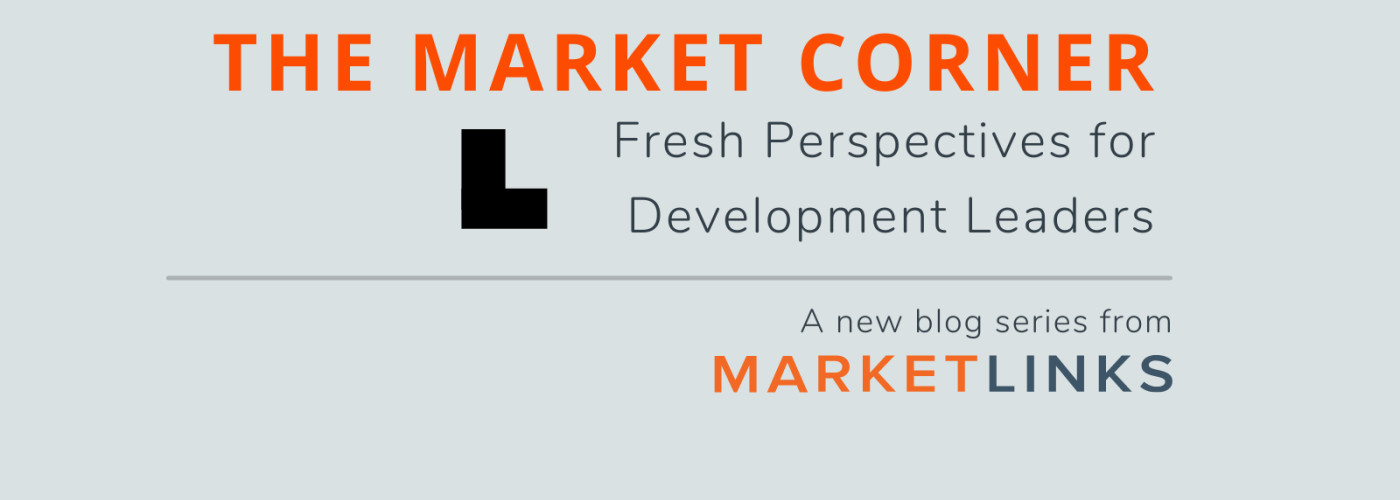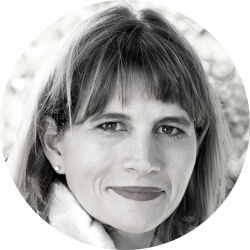The Market Corner: Advice for Aspiring Senior Market Systems Development Leaders
Image

Earlier this month, I spoke with market systems development (MSD) expert Mike Klassen and two MSD leaders, Nina FitzSimons CEO of PRISMA, a Department of Foreign Affairs and Trade-funded program in Indonesia, and Bidowra Khan, Team Lead for Social Inclusion and Support Market Systems for the USAID Feed the Future Rice and Diversified Crops Activity in Bangladesh, to explore the opportunities and responsibilities with which MSD leaders are charged. In the second installment of this month's Market Corner series, I share their advice for the next generation of MSD leaders.
Be an all-rounder.
MSD relies upon the analytical, influencing and relationship-building skills of leaders and staff. We have templates and tools, but the approach relies heavily on people, leaders, and team members with the right mix of competencies. This recognition has led to the creation of a MSD competency framework and the forthcoming addition focused on Team Leader competencies.
It is unsurprising that Nina, Bidowra, and Mike all agree on the importance of honing a range of competencies rather than focusing on one or two — especially hard — skills.
“Be an all-rounder, if you want to be a good MSD Leader” — Nina Fitzsimons
In their opinion, soft skills like relationship management and communication skills are essential for effective MSD leaders. They help shape the culture of the program, a crucial ingredient in the secret MSD leadership sauce. These are competencies that can be cultivated in a technical MSD role or non-technical/non-MSD roles.
Share your knowledge and insights.
For Bidowra, being a MSD leader doesn't end at the close of the business day. It is a way of perceiving the world and interacting with others that can even carry over to your personal life. She feels she has a responsibility to be a MSD thought leader and to pass on her knowledge and insights, so that the MSD approach is not just understood but owned by team members and partners. By adhering to the accountability of the MSD leader, which often goes beyond the role of a skilled program lead, we can nurture aspiring leaders in the community of practice.
“Your duty as a MSD thought leader doesn't stop the moment the contract expires.” — Bidowra Khan
Believe in yourself.
Recognizing that you have valuable leadership competencies for a MSD program, regardless of your gender, professional background, or where you have cultivated your leadership skills, is important. Being a good MSD leader is not about perfection but about the process of trying, failing, and adapting.
“We are not looking for the unicorn leader who can do everything perfectly.” — Mike Klassen
Nina acknowledged that self-doubt because of a lack of technical MSD background in the past held her back from pursuing MSD leadership opportunities.
The absence of a formal training program for (aspiring) MSD leaders means that aspiring leaders need to believe they can succeed and be entrepreneurial when it comes to acquiring the necessary skills. There are a number of ways in which aspiring leaders can hone their skills, admittedly though it may be harder during COVID due to fewer opportunities for field-based work. The forthcoming MSD Team Leader Competency framework will help current and aspiring leaders focus on cultivating the most essential skills.
Seek out traditional and non-traditional role models.
Observation is a powerful tool; you can learn a lot by watching what Team Leaders do. Learning from empowering leaders is preferred, but as much can be learned by observing what not to do from less effective leaders. For Bidowra, a role model doesn't need to occupy the Team Leader position. She has learned by observing team members, regardless of age or position, and MSD thought leaders she has met at industry events like the Market System Symposium and ILO/ITC’s Gender Academy. She has even learned valuable lessons by observing a donor representative associated with her activity who guided an effective consultation process with different stakeholders to ensure the activity design was adequately embodied in the day-to-day implementation.
Find organizations and people that will nurture your talents.
While you can clearly develop MSD competencies on your own or using the MSD competency framework and the resources it provides, it is easier when you have a supportive organization invested in your professional development. She has experienced first hand project leads who have nurtured growth and systems thinking as an organizational culture. Creating an enabling environment that allows for rising leaders to fail and learn is crucial because that learning process is integral to the MSD approach. Bidowra wanted to work on the RDC Activity because she knew the organization would develop her skills and support her to navigate the process of applying a systems lens to development.
Don’t wait.
Even if you feel like your title or role doesn’t automatically provide a ready platform for practicing leadership, don’t wait. Bidowra, in a previous role as a Women’s Economic Empowerment (WEE) Advisor on Katalyst, found that by citing evidence and frameworks from more established practitioners in her field and building strategic relationships within the large MSD program, she was able to create new leadership opportunities for herself including making the case to the donor on the importance of mainstreaming WEE within the program.
Start practicing.
In our work as MSD practitioners, we are encouraged to pilot new concepts at a small scale. Similarly, for aspiring senior leaders, Mike recommends seeking out opportunities to practice and develop different competencies. An MSD project offers endless opportunities, from a partner meeting to a strategy review session, to sharpen your analytical skills, strengthen your implementation acumen, and build relationships. Opportunities to hone MSD leadership skills are not limited to implementers. Donor representatives can also find opportunities to practice MSD competencies. One place to start practicing is with creating the space for the experimentation. This skill can be practiced during one-on-one check-ins with implementing partners or in larger sessions like the one Bidowra referenced above.
Have advice for aspiring senior leaders of your own? Post via your Marketlinks account or send them to us at info@marketlinks.org, and we will include these in the next installment of the blog.
Stay tuned for next month’s Market Corner, which will explore the practical application of systems thinking in e-business. And in the meantime, tell us what you think are critical MSD leader competencies or advice you have for aspiring leaders. Post your thoughts or share a useful tool via your Marketlinks account, or send them to us at info@marketlinks.org.
About
Image

Mike Klassen
Mike Klassen is an independent consultant and market systems specialist at the BEAM Exchange with over 10 years of experience building capacity in MSD projects and the organizations which implement them. He has led numerous sector-wide learning efforts focused on MSD organizational capacities, such as the BEAM Exchange’s 2020 MSD Procurement Clinics. He is currently the facilitator for a task team of the DCED’s MSD Working Group that includes donors, implementers, and consultants to articulate the core competencies of MSD Team Leaders, with a focus on criteria for evaluation, future pipelines, and sector-wide leadership development opportunities. The findings of this work will be communicated widely throughout 2022.
Image

Nina FitzSimmons
Nina FitzSimons has more than 20 years of experience managing development programs, primarily in southeast Asia. With a wide skill set, Nina has experience in capacity development, strategic communications, GESI, grants management, and, more recently, MSD. For the past eight years, Nina has held senior management roles in MSD programs and is currently CEO of one of the largest MSD programs in the region. Nina enjoys working in diverse environments and developing strong and cohesive teams. Nina is a keen mountain biker and a closet artist.
Image

Bidowra Khan
Bidowra Khan has over 13 years of experience in MSD ecosystems, specializing in inclusive agricultural market systems, financial and gender inclusion, and enhancing resilience through food security for rural marginalized farmers and entrepreneurs. Bidowra has in-depth experience on analyzing, working on, and leading sustainable, inclusive, and systemic private sector-led solutions in different agricultural market systems and in interconnected markets, such as financial inclusion, and in cross-cutting themes such as gender integration. Bidowra previously worked for UK Aid’s flagship MSD project in Bangladesh, where she developed and applied tools to monitor and measure economic empowerment of women achieved in the agriculture sector, such as Women’s Economic Empowerment Index. Bidowra wishes to pursue working in this challenging yet rewarding environment to ensure effective inclusion in market system frameworks. Bidowra is Bangladeshi-born, and she is fluent in English and Bengali.
Image

Holly Lard Krueger
Holly Lard Krueger is a managing partner at the Canopy Lab and a market systems development expert with over 15 years of experience providing technical advice in the field of private sector development/engagement with a specific focus on applying digital technology, gender equality and social inclusion (GESI), market systems, and Value for Money (VfM) principles to project and strategy design for agriculture, humanitarian aid, business enabling environment reform, trade, urban development, and women’s economic empowerment programs.
Holly is a proven strategic leader, having managed large market systems projects with diverse teams. She is also skilled as a strategic advisor, coach, and trainer in the practical application of systems approaches to market development, and she is currently an advisor to USAID’s Bureau for Humanitarian Assistance, a World Bank-funded program in West Africa (TFWA), a DFAT-funded program in Indonesia (PRISMA), and a FCDO-funded program in the Democratic Republic of the Congo (Essor). Holly is based in Morocco and has worked in over 15 countries in Africa, Asia, and the Middle East and has implemented projects and conducted evaluations for leading donors, including the Bill & Melinda Gates Foundation, DFAT, IFC, FCDO, USAID, and the World Bank. She has an M.A. from Johns Hopkins School of Advanced International Studies and a B.A. from Vanderbilt University.


